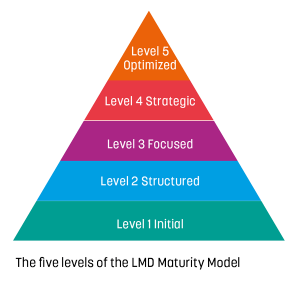WCO develops a model to assess maturity of leadership programmes
2 March 2023
Leadership competencies and skills oil the wheels of organizational progress and success. To support its Members in this field, the WCO has developed a Leadership and Management Development Programme. This article introduces the Maturity Model, one of the tools developed as part of this programme.
Leadership as Partnership
Academic researcher Russ S. Moxley, in an article entitled Leadership as Partnership, explains: “Leadership is typically understood as something an individual provides. Leaders lead, provide a compelling vision, set direction, determine strategy, motivate and inspire. This understanding has worked reasonably well, but it has its limitations because there is only so much that any individual can do. […] To be successful in the long haul, organizations, including Customs administrations, need systems, structures, and practices of leadership that call forth the energies of all employees.”[1]
The WCO Leadership and Management Development (LMD) Programme is in line with such a view and focuses on developing leadership and management skills, from middle managers through to top executives, within Customs administrations. It aims to modernize the management culture in the whole organization so that the organization achieves its vision and delivers its strategy in an easier and more effective way, while living its values.
An assessment at four levels
The LMD Programme has developed a Maturity Model to support Customs administrations wishing to assess their level of maturity in implementing and promoting a leadership-oriented culture. Results of the assessment then guide the Secretariat, when requests for assistance are received, in defining the type of activities to be deployed with a given administration.
The Maturity Model takes into consideration the four levels of intervention of the LMD Programme:
– At the individual level, experts work with managers to strengthen their capacity in knowing themselves (qualities, beliefs, convictions, values and vision, influencing the way they perceive situations, people, challenges or opportunities); managing themselves (being mindful of thoughts, emotions, words and deeds at all times); and understanding others (really listening to others, and finding out why and how they think and act as they do). The idea is to be able to adopt a management style based on the human relations theory, while at the same time being highly demanding in terms of outputs and results.
– At the management team level, experts discuss techniques aimed at creating a working environment based on trust and openness, where each member of the management team is not afraid of confrontation and accountability, and where honest, open and constructive relations are natural.
– At the stakeholder level, experts work with managers to enable them to establish or enhance partnerships with external entities through effective engagement practices, negotiations and communication.
– At the organizational level, experts work with managers to ensure strategy, vision and values are defined and communicated, channels of communication are established, managers are exemplifying the values, ethics and policies of the organization, continuous learning is embedded into the organizational culture, and much more.
Five maturity levels
Each of these levels of intervention has five corresponding maturity levels for which various statements apply. To assess its maturity, an administration would have to choose which statement best reflects its situation. For example, “Level 1 – Initial” in the category “Individual” includes the following statement: “Communication about tasks, objectives, roles and expectations is unclear and irregular, there are no channels established for formal or informal feedback, exchange of ideas, expression of needs.” In the same category, “Level 5 – Optimized” reads: “Nurturing and coaching future leaders is the main focus. A variety of management and communication tools is regularly applied with an objective to develop people as future leader-managers and as better persons.”

Undertaking a maturity assessment makes it possible to identify areas or issues that need improvement. Implementing some of the activities described in the assessment is a task full of challenges, and requires significant time investment, for example, developing a talent management programme or promoting team work, critical thinking and innovation.
In other words, it is the start of a journey. The WCO Secretariat stands ready to accompany administrations wishing to improve their staff leadership skills, and offers them three types of activity:
- the Top Executive Retreat (TER), which is aimed at strengthening the capacity of Directors General and their top executive teams to lead and drive reform and modernization agendas;
- the LMD Workshop, which aims at providing senior and promising middle-level Customs Managers with a better understanding of modern management approaches and their own personal leadership attitude and behaviour, based on improved self-knowledge and self-awareness;
- the Middle Management Development (MMD) Training, which aims at equipping middle managers with a set of fundamental management competencies and skills.
Administrations wishing to develop their national training capacity in this domain can enrol officers in the MMD train-the-trainers workshop. Moreover, a Leadership and Management Development e-learning module is available in English, French, Spanish, Russian and Arabic on the WCO CLiKC! platform.
More information
Capacity.Building@wcoomd.org
[1] Moxley, R.S. (1999), Leadership as partnership. Leadership in Action, 19: 9-11. https://doi.org/10.1002/lia.4070190302

